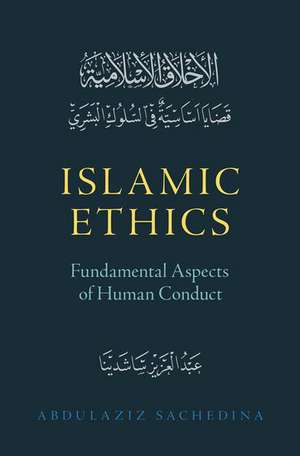Islamic Ethics: Fundamental Aspects of Human Conduct
Autor Abdulaziz Sachedinaen Limba Engleză Hardback – 21 noi 2022
Preț: 232.21 lei
Preț vechi: 255.81 lei
-9% Nou
Puncte Express: 348
Preț estimativ în valută:
44.43€ • 46.51$ • 36.98£
44.43€ • 46.51$ • 36.98£
Carte disponibilă
Livrare economică 26 februarie-04 martie
Preluare comenzi: 021 569.72.76
Specificații
ISBN-13: 9780197581810
ISBN-10: 0197581811
Pagini: 224
Dimensiuni: 238 x 164 x 24 mm
Greutate: 0.54 kg
Editura: Oxford University Press
Colecția OUP USA
Locul publicării:New York, United States
ISBN-10: 0197581811
Pagini: 224
Dimensiuni: 238 x 164 x 24 mm
Greutate: 0.54 kg
Editura: Oxford University Press
Colecția OUP USA
Locul publicării:New York, United States
Recenzii
Professor Sachedina's impressive magnum opus displays his deep and wide knowledge of Islamic ethical thought and practice. It illuminates several different views of the relations among theology, ethics, and law in Islam, while arguing for interpretive jurisprudence, which embodies ethics and draws on theology. I enthusiastically recommend this rich and important book.
Abdulaziz Sachedina is a towering figure in Islamic ethics, and this is his masterpiece, the capstone to decades of rigorous study, observation, teaching, mentoring -- and disciplining himself to the demands of a jurist and scholar who embodies the best in his tradition. This treatise on 'fundamental aspects of human conduct' is at once a comprehensive overview and a penetrating analysis and interpretation of theological and juridical discourses in Islam, cast now within an ethical framework that illuminates the profound moral foundations of the Islamic legal tradition. It will quickly become required reading for all who seek to understand the inner logic of a vastly complex and evolving world religion.
Sachedina's work will prove useful both for scholars of Islamic law and for those working on constructive religious ethics.
Sachedina's display of past and present dynamics in Islamic jurisprudence, and the extent to which they meet the Qurānic ethical ideals, do remain at the ontological level within the subjectivist (traditionalist) camp. He does not wish to detach them from revelation. Only at the epistemological level, he sets things in motion through applying methods of juridical adaptation to significant changes in society in modern times. He justifies these adaptations by considering them rooted in the tradition, which he seeks to resuscitate and revive.
Abdulaziz Sachedina is a towering figure in Islamic ethics, and this is his masterpiece, the capstone to decades of rigorous study, observation, teaching, mentoring -- and disciplining himself to the demands of a jurist and scholar who embodies the best in his tradition. This treatise on 'fundamental aspects of human conduct' is at once a comprehensive overview and a penetrating analysis and interpretation of theological and juridical discourses in Islam, cast now within an ethical framework that illuminates the profound moral foundations of the Islamic legal tradition. It will quickly become required reading for all who seek to understand the inner logic of a vastly complex and evolving world religion.
Sachedina's work will prove useful both for scholars of Islamic law and for those working on constructive religious ethics.
Sachedina's display of past and present dynamics in Islamic jurisprudence, and the extent to which they meet the Qurānic ethical ideals, do remain at the ontological level within the subjectivist (traditionalist) camp. He does not wish to detach them from revelation. Only at the epistemological level, he sets things in motion through applying methods of juridical adaptation to significant changes in society in modern times. He justifies these adaptations by considering them rooted in the tradition, which he seeks to resuscitate and revive.
Notă biografică
Abdulaziz Sachedina is Professor and Endowed IIIT Chair in Islamic Studies at George Mason University in Fairfax, Virginia. He has been conducting research and writing in the field of Islamic Law, Ethics, and Theology (Sunni and Shiite) for more than four decades. In the last twenty years he has concentrated on social and political ethics, including Interfaith and Intrafaith Relations, Islamic Biomedical Ethics and Islam and Human Rights. He is the author of numerous books, most recently Islam and the Challenge of Human Rights (OUP, 2009).
